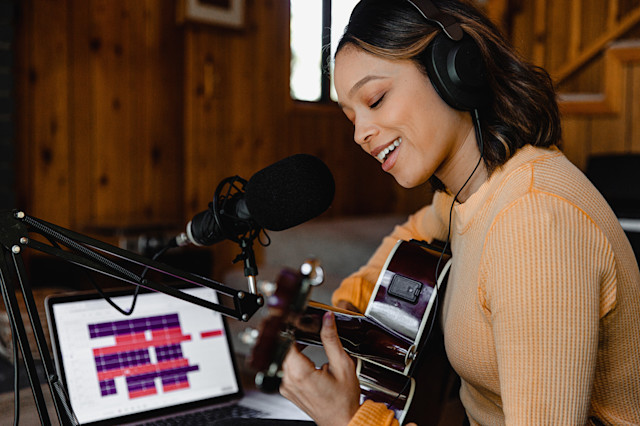EP vs LP: Differences Between The Album Formats
April 24, 2024 - Explore the key differences between EP vs LP album formats and find the best fit for your music, whether you're a new artist or established in the industry.

What exactly is the difference between EP vs LP? These two album formats have a long history in the music business and are still the industry standard today.
The term EP stands for Extended Play. It's generally shorter than an album but longer than a single. EPs are the perfect middle ground for artists who want to release a small collection of songs without the commitment of a full album.
Typically, an EP has three to five tracks, offering listeners a taste of the artist's work.
LP, or Long Play, is the traditional format for an album. With more than five songs, LPs are designed to captivate listeners with an artist's range and depth. They are the cornerstone of an artist's discography, telling a story or conveying a more complex concept through music.
Let's look at the differences in more detail so you can decide which format would best suit your music.
EP vs LP
What Is an EP?
EP, or Extended Play, is a term coined to denote a record that falls between a single and a full-length album. EP albums are characterized by their shorter tracklist compared to an LP album.
EPs historically served as a middle-ground format, offering more to audiences than a single but less than an LP.
EP Length and Content
An EP album typically consists of a collection of songs ranging from four to six tracks. The total playtime can be about 20 minutes, giving it a succinct yet impactful way to enjoy new music.
Unlike a full album, an EP is shorter and more like a mini album, giving a snapshot of an artist's current creative phase.
Benefits for New Artists
For new artists, releasing an EP can be an effective strategy for introducing themselves.
Creating an EP requires fewer resources than a full-length album, which can make the first EP release a practical stepping stone.
In my opinion, EP is also a great option as it gives listeners a substantial glimpse into the artist's musical identity without overwhelming them with content, making EP records a smart choice for artists building their careers.
What Is an LP?
LP, or Long Play, is a term that comes from the days when vinyl records were the standard format. It describes a vinyl record that can play more extended content. A standard LP album often contains a full-length album, a typical milestone in an artist's musical career.
LP Structure and Duration
LPs typically contain about 10-12 tracks and offer 30 to 50+ minutes of playtime.
They may come as a single vinyl record or in a Double LP format, which simply means it's an album spread over two separate records.
An LP album signifies a more complete collection of an artist's creative work, not just a slice of their artistic expression. It's the standard format for whole albums because they present the entirety of a musician's thoughtfully curated collection of songs.
Industry Perspectives
Record Labels
Record labels are pivotal in deciding the format of music releases. They consider various factors, including market trends, artist branding, and production costs, when deciding whether an EP or an LP is the appropriate release for their artists.
Major releases, especially by flagship artists, are typically LPs due to their comprehensive and high-value nature in both streaming and physical sales.
Music Business Trends
Streaming platforms have influenced a shift in the music business, leading to more frequent releases of singles and EPs to maintain a consistent presence in listeners' feeds. This strategy keeps you engaged and allows artists to gauge your reactions to different styles before committing to a more substantial LP project.
As the industry leans more toward digital music, the vinyl record format has been experiencing a nostalgic resurgence. Vinyl is often favored by audiophiles and collectors for its high-quality sound and tangibility. Sales of vinyl records and vintage record players have actually seen a resurgence in recent years.

Format and Audience Impact
Physical vs Digital Formats
There's something nostalgic about handling a vinyl record; it makes you realize you’re touching a piece of history. When artists release vinyl records, they create a tangible connection between their work and your record player.
I know I personally enjoy the warm and rich sound of vinyl records.
But, I also must admit the digital world is catching up to the warmness! The latest analog and tape emulation plugins for DAWs like Soundtrap definitely help warm up the digital formats. And digital remasters of our favorite tunes have brought them into the modern era.
Of course, digital formats offer many incredible benefits. Digital albums can be stored on devices or streamed, offering a convenient and portable way to listen to music. EPs and LPs are both available in digital form, allowing new listeners to explore and enjoy a broader array of music without needing physical storage space.
Connecting with Fans
The format of music releases, whether EP or LP, influences how artists connect with their fan base and attract new listeners.
Artists often release limited edition vinyl records, which can become coveted items among their fans. These physical releases foster a sense of exclusivity and community as fans collect and share their experiences with each other.
Digital releases help artists reach a global audience almost instantaneously through streaming platforms like Spotify, Apple Music, and many others This immediacy can create a strong bond as you and other fans around the world experience new music together at the same time.
Another aspect I really like about digital formats is the ability for artists to experiment with releasing singles and shorter EPs to keep their fan base engaged between larger LP projects.
Whether you prefer dropping the needle on a record or clicking play on a screen, each format provides a unique way for you to enjoy music and support your favorite artists.
Evolution of Music Releases
Historical Progression
The progression of music formats over the years is fascinating.
From the 1940s 78 rpm discs with single songs to the introduction of LP records in the 1950s, to easily portable cassettes in the 1980s, to the peak of popularity of CDs in the late 1990s, to MP3 players and digital downloads that began to disrupt the physical media sales in the early 2000s, the music format has gone through many evolutions.
Recent Trends in Music Consumption
In recent years, our music consumption habits have gravitated towards convenience and accessibility.
Streaming platforms have emerged as the most popular format, fundamentally changing the landscape of new releases. This shift has influenced both new sounds and album sales, as you can seamlessly hop between artists and genres.
The ease of access to new music releases through streaming platforms has perhaps stretched the emphasis on maintaining a high sound quality in every track. The emphasis has now shifted to capturing your attention with compelling music, hoping you'll hit that repeat or share button on your social networks.

Strategies for Artists
Marketing with EPs
EPs are a great way to generate buzz and keep your audience engaged without the commitment of an LP. For new and independent artists, EPs can act as powerful promotional tools.
You should consider releasing EPs between full albums to maintain visibility. Utilize EPs to highlight bonus tracks or remixes that didn’t make it onto previous albums.
An EP is also a great tool for testing the waters for your first release.
Marketing with LPs
You should consider releasing an LP once you've tested the waters and know what works with your fan base. By this time, you should also have developed your sound and image further and better understand what songs your LP should consist of.
LPs represent a complete body of work and tend to require more extensive marketing campaigns. They are more suitable for established artists with a solid fan base that eagerly awaits a more comprehensive collection of songs.
Consider announcing your album with a single release to stir interest when you release an LP.
Then, build anticipation with pre-order bonuses or exclusive content through your social media platforms. And make sure to harness the narrative of your past works to promote the new LP.
Choosing the Right Format for Releases
Deciding whether to release an EP or LP really comes down to these questions:
What stage is your music career in? Indie artists might do better with EPs when starting out.
How extensive is your current catalog? New LPs can benefit from the foundation laid by prior EPs or singles.
What are your audience's expectations? Gauge what your fans are eagerly anticipating, be it a short release or an extensive LP.
Conclusion
The music industry's evolution over the years has brought us many different formats, but EPs and LPs remain the prominent choices today.
While the term LP originally referred to a long-playing vinyl record, it now encompasses any full-length album with a significant number of tracks.
EPs offer a shorter collection of songs, making them ideal for new artists or those looking to test how their fans receive a new direction in their music.
With the resurgence of vinyl records and the convenience of digital downloads, we have a range of options to enjoy our favorite songs. Each format offers a unique way to connect with music.
If you're an artist, both EP and LP formats should be part of your music release and fan engagement strategies. Use EPs to determine which songs are the most successful, and let that steer your decision on the artistic direction of your LP.
About the author
Tero Potila is a professional music composer and producer. His career combining knowledge and experience from music, TV, film, ad, and game industries gives him a unique perspective that he shares through posts on teropotila.com.
Get started with Soundtrap today!